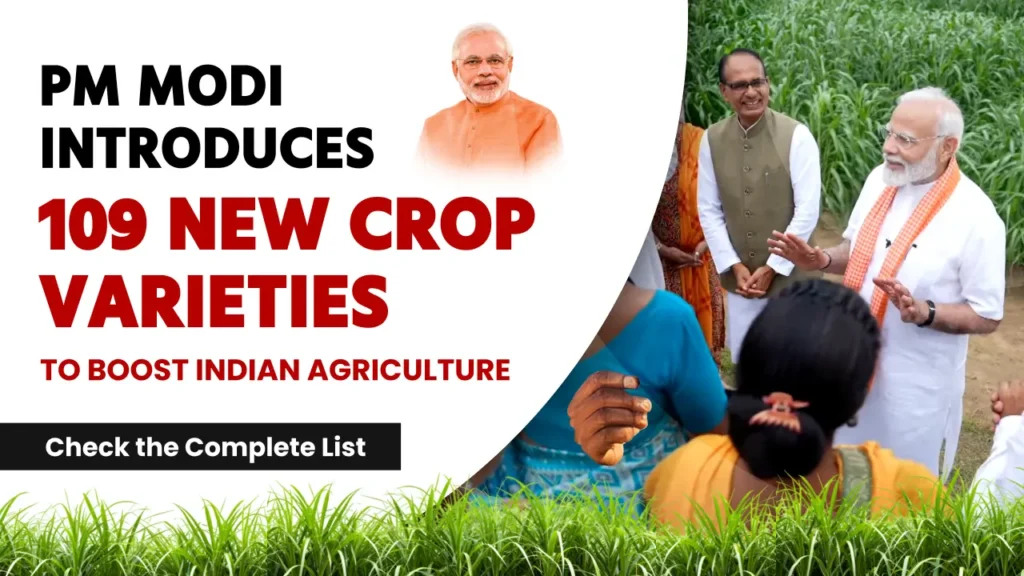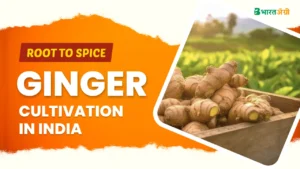
Prime Minister Narendra Modi released 109 varieties of 61 crops on Sunday, August 11. These varieties include cereals, horticultural crops, fodder crops, and more. The use of new and hybrid varieties in agriculture aims to simplify and enhance farming practices. These hybrid varieties are expected to increase yields and improve quality, helping farmers secure better prices and boost their income. In this blog, we will provide detailed information about the newly released crop varieties and the latest crops in India through our farming news section.
109 Varieties of 65 Crops Released
The Hon’ble Prime Minister of India, Shri Narendra Modi, recently unveiled 109 new crop varieties, representing a significant leap forward in India’s agricultural landscape. These innovative varieties, cultivated by the Indian Council of Agricultural Research, were officially released at the ICAR-Indian Agricultural Research Institute’s research fields in Pusa, New Delhi. This initiative marks a pivotal development in advancing agricultural practices and improving crop productivity across the country.
On August 11, the Prime Minister unveiled 109 varieties of 61 crops, encompassing 34 field crops and 27 horticultural crops. Among the field crops, the released varieties include seeds for cereals, millets, forage crops, oilseeds, pulses, sugarcane, cotton, fiber, and other potential crops. The horticultural selections feature diverse varieties of fruits, vegetables, plantation crops, tubers, spices, flowers, and medicinal plants. This initiative underscores the importance of these new varieties in enhancing food security, promoting agricultural diversity, and addressing critical nutritional challenges in India. The newly introduced varieties are climate-resilient, nutritionally rich, and adaptable to changing environmental conditions. This release marks a notable advancement in the government’s commitment to strengthening and future-proofing Indian agriculture.
Launched New Varieties of These Crops
The newly released varieties include a wide range of crops to meet various farming needs. These are:
- Cereals: Rice, wheat, maize
- Millets: Barley, sorghum, pearl millet, finger millet
- Pulses: Chickpea, pigeon pea, lentil, field pea, faba bean, mung bean
- Oilseeds: Safflower, soybean, groundnut, sesame
- Fibre Crops: Cotton, jute
- Forage Crops: Pearl millet, berseem, oats, maize, sorghum
- Sugar Crops: Sugarcane
- Potential Crops: Buckwheat, amaranth, winged bean, adzuki bean, pillipesara, kalingda, perilla
- Fruits: Mango, pomegranate, guava, bael, pummelo, musk melon, watermelon
- Vegetables: Potato, tomato, capsicum, bottle gourd, okra
- Flowers: Crossandra, gladiolus, marigold, tuberose
- Plantation Crops: Coconut, cocoa, cashew
- Spices: Ajwain, fennel, mango ginger, nutmeg, small cardamom
- Medicinal Plants: Ashwagandha, mandukparni, velvet bean
These varieties are designed to enhance productivity and support diverse agricultural practices across India, providing farmers with a broader selection of high-yield and quality crops.
Visit www.pib.gov.in for the detailed list of all the varieties.
Among the millet varieties introduced, “Pooja 1801” received praise for its high iron and zinc content. Shri Modi expressed optimism that this variety could significantly contribute to fighting child malnutrition, in collaboration with the Ministry of AYUSH.
During the event, the Prime Minister visited a field showcasing ‘Pusa 2002,’ a millet variety that matures in just 70 days, compared to the 110 days needed by most other varieties. He highlighted the importance of adopting such climate-resilient crops to diversify agricultural practices and ensure food security amidst unpredictable climatic conditions. The rapid maturation of this variety is anticipated to be transformative for farmers, allowing them to adapt more swiftly to changing weather patterns and agricultural cycles.
Shri Modi also acknowledged the groundnut variety ‘Girnar 6’ for its high oil content and encouraged ongoing efforts to enhance oil content in other crop varieties to improve their nutritional and economic value. Additionally, he discussed the potential of sorghum and other millet crops as sources of bioethanol, underscoring the importance of diversifying energy sources and advancing sustainability in agriculture.
The Prime Minister expressed particular satisfaction with the chickpea variety “Nandyal 1267,” noting its suitability for mechanical harvesting. He emphasized the need to develop more such pulses varieties, as timely harvesting and secure storage are crucial for boosting farmers’ productivity and profitability.
PM Modi Interacts with Farmers and Scientists
Approximately 30 farmers shared their personal experiences and the challenges they face in agriculture with Prime Minister Narendra Modi. Shri Modi encouraged the farmers to collaborate and organize effectively to address common issues within the farming community. The discussion also highlighted the difficulties associated with the rapid adoption of new crop varieties and explored strategies to overcome these challenges.
The Prime Minister emphasized the significance of millet, noting their potential to combat malnutrition and enhance food security in the country. During his interactions with farmers and scientists, Shri Modi stressed the need to promote the nutritional benefits of millet to both the farming community and the general public, particularly women. He advocated for initiating a dialogue series involving key stakeholders farmers, traders, hotel chefs, and startups to explore innovative methods for increasing millet production and consumption.
New varieties will increase farmers income – Agriculture Minister
The Union Agriculture Minister, Shivraj Singh Chouhan, recently announced the development of 109 seed varieties across 61 crops. He congratulated the scientists who played a pivotal role in creating these innovative seed varieties. Chouhan highlighted that these new varieties are set to revolutionize the lives of farmers, enhance their profitability, contribute to public nutrition, and boost exports. He emphasized that today marks a momentous occasion for India’s farming community. Furthermore, he acknowledged that Prime Minister Modi has dedicated these climate-resilient varieties to farmers, aiming to increase agricultural production and strengthen the nation’s food reserves.
For the latest updates and news, including recent developments in agriculture news and latest agriculture news in India, stay tuned with BharatAgri.
Conclusion
- Prime Minister Modi’s release of 109 new crop varieties represents a significant advancement in India’s agriculture sector, focusing on enhancing productivity and ensuring food security.
- The introduction of these new crop varieties, including cereals, millets, pulses, and horticultural crops, aims to improve yields, quality, and climate resilience.
- The new varieties are designed to support diverse farming practices, address nutritional needs, and offer better economic opportunities for farmers.
- Key varieties like “Pooja 1801” and “Pusa 2002” are expected to make a substantial impact by improving nutrition and adapting to climate changes, positioning them as high-yield crops.
- The engagement with farmers and scientists during the event underscores the government’s commitment to addressing agricultural challenges and promoting sustainable practices.
- Union Agriculture Minister Shivraj Singh Chouhan’s remarks highlight the transformative potential of these varieties for farmer incomes and national food security.
FAQs:
PM Modi introduced 109 new crop varieties across cereals, millets, pulses, and horticultural crops.
The new varieties aim to increase yields, improve crop quality, and boost farmers’ income.
Stay updated with the recent agriculture news today and developments on the BharatAgri Website.




